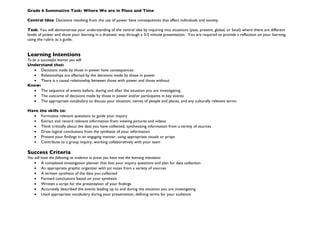
Wwpt grade 6 summative task ver 2
- 1. Grade 6 Summative Task: Where We are in Place and Time Central Idea: Decisions resulting from the use of power have consequences that affect individuals and society. Task: You will demonstrate your understanding of the central idea by inquiring into situations (past, present, global, or local) where there are different levels of power and show your learning in a dramatic way through a 3-5 minute presentation. You are required to provide a reflection on your learning, using the rubric as a guide. Learning Intentions To be a successful learner you will: Understand that: • Decisions made by those in power have consequences • Relationships are affected by the decisions made by those in power • There is a causal relationship between those with power and those without Know: • The sequence of events before, during and after the situation you are investigating • The outcome of decisions made by those in power and/or participants in key events • The appropriate vocabulary to discuss your situation, names of people and places, and any culturally relevant terms Have the skills to: • Formulate relevant questions to guide your inquiry • Extract and record relevant information from viewing pictures and videos • Think critically about the data you have collected, synthesizing information from a variety of sources • Draw logical conclusions from the synthesis of your information • Present your findings in an engaging manner, using appropriate visuals or props • Contribute to a group inquiry, working collaboratively with your team Success Criteria You will have the following as evidence to prove you have met the learning intentions: • A completed investigation planner that lists your inquiry questions and plan for data collection • An appropriate graphic organizer with jot notes from a variety of sources • A written synthesis of the data you collected • Formed conclusions based on your synthesis • Written a script for the presentation of your findings • Accurately described the events leading up to and during the situation you are investigating • Used appropriate vocabulary during your presentation, defining terms for your audience